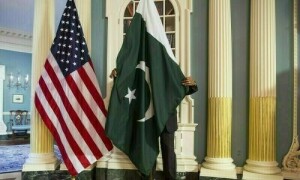WILL there ever be peace on earth? Not in my lifetime. And not on this earth.
World War II detonated in sequence: the Anschluss or annexation of Austria by Germany in March 1938; Germany’s invasion of Czechoslovakia in March 1939; and Hitler’s incursion (with Stalin’s support) into Poland in September 1939.
World War III began in 1945. It has been an ongoing affair, fought in Vietnam, Cambodia, Iraq, Syria, Libya and Egypt. It is now in Yemen, in Gaza and in Ukraine. It will, if President Donald Trump has his way, soon spread across the globe. No single leader since Hitler has made militarisation his mantra. Trump is not content on ensuring, as past US presidents have done, that the US had the capacity to defend itself against any aggressors foolhardy enough to cross the Atlantic or the Pacific oceans. He wants every ploughshare in the world converted into swords.
For the moment, his attention is riveted on European countries and Japan. He demands that they become responsible more for their own defence rather than relying on the US as their guarantor of the last resort. In this, he has the support of, for example, another Donald — Polish Prime Minister Donald Tusk, who advised his EU colleagues: “Don’t ask America what it can do for our security. Ask yourselves what we can do for our own security.” (Tusk cruelly inverted J.F. Kennedy’s famous phrase: “Ask not what your country can do for you, ask what you can do for your country.”)
WWIII began in 1945. It has been an ongoing affair.
Trump’s demand is for an increase in defence spending to five per cent of each country’s GDP (more than twice the EU’s current average). Germany spends 1.9pc, France 2.1pc, Britain 2.3pc and Japan 1.4pc. At the opposite end of the spectrum, Ukraine spends 34pc, Israel 8.8pc, and Saudi Arabia 7.3pc. If Trump’s proposal succeeds, EU Nato members must raise their defence budgets by €613 billion ($708bn) annually. (EU green and social goals are a poor second at €375 bn.)
Trump’s plan is less to reinforce Europe’s defence than feed America’s voracious military-industrial complex. In FY2024, the US foreign military sales system was $117.9bn, a 45pc increase over FY2023. Prominent customers were Türkiye $23bn, Israel $18.8bn and Romania $7.2bn.
It is reported that “close to half of the fighter jets in active service across European air forces originate from the US, while American — rather than European — missile defence systems remain the most widely deployed on the continent”. To avoid becoming another Ukraine, Poland has acquired so many tanks that it has more than the British, French and German armies combined.
In 1961, President Dwight Eisenhower (once a general) warned his country against the “conjunction of an immense military establishment and a large arms industry”. He added: “We must guard against the acquisition of unwarranted influence, whether sought or unsought, by the military-industrial complex. The potential for the disastrous rise of misplaced power exists and will persist.”
It has. Trump does not have the time to read Eisenhower’s farewell speech, nor do the contractors who benefit from the Pentagon’s largesse. One report reveals that during 2020-2024, “out of the total defence spending of $4.4 trillion, private firms got $2.4tr”. Out of this, $771bn went to the top five Pentagon contractors — Lockheed Martin, RTX, Boeing, General Dynamics and Northrop Grumman. No wonder that retiring Pentagon officials find a second career in industry.
Does China pose a threat to the US, as Trump repeatedly declaims? His predecessor Richard Nixon did not think so. Exchanging views with Chairman Mao Zedong in February 1972, he said: “China doesn’t threaten the United States [and] the United States has no territorial de--signs on China. Nei-ther China nor the United States — both great nations — want to dominate the world.”
Times have changed. If the past bore the stamp of Great Britain and the present that of Trump’s United States, the future belongs to a unified China with global ambitions. (Reunification is a matter of time. Nixon admitted as much in 1972: “There is one China and Taiwan is a part of China.”) Meanwhile, the US spends $997bn on offensive defence outside its borders. China expends less than a third of that — $314bn — on defensive preparation for a conflict it does not regard as inevitable.
President Trump has less than four years to achieve his objectives. In the six years before war broke out (1934-1939), Hitler’s domestic industries increased his fleet of combat aircraft from 840 to 4,733. Future battles will be in the air — planes vs planes, missiles vs missiles, satellites vs satellites. Star Wars will not be fought in Hollywood. Trump’s unchecked chauvinism today could result in tomorrow’s G?tterd?mmerung.
The writer is an author.
Published in Dawn, July 31st, 2025










































